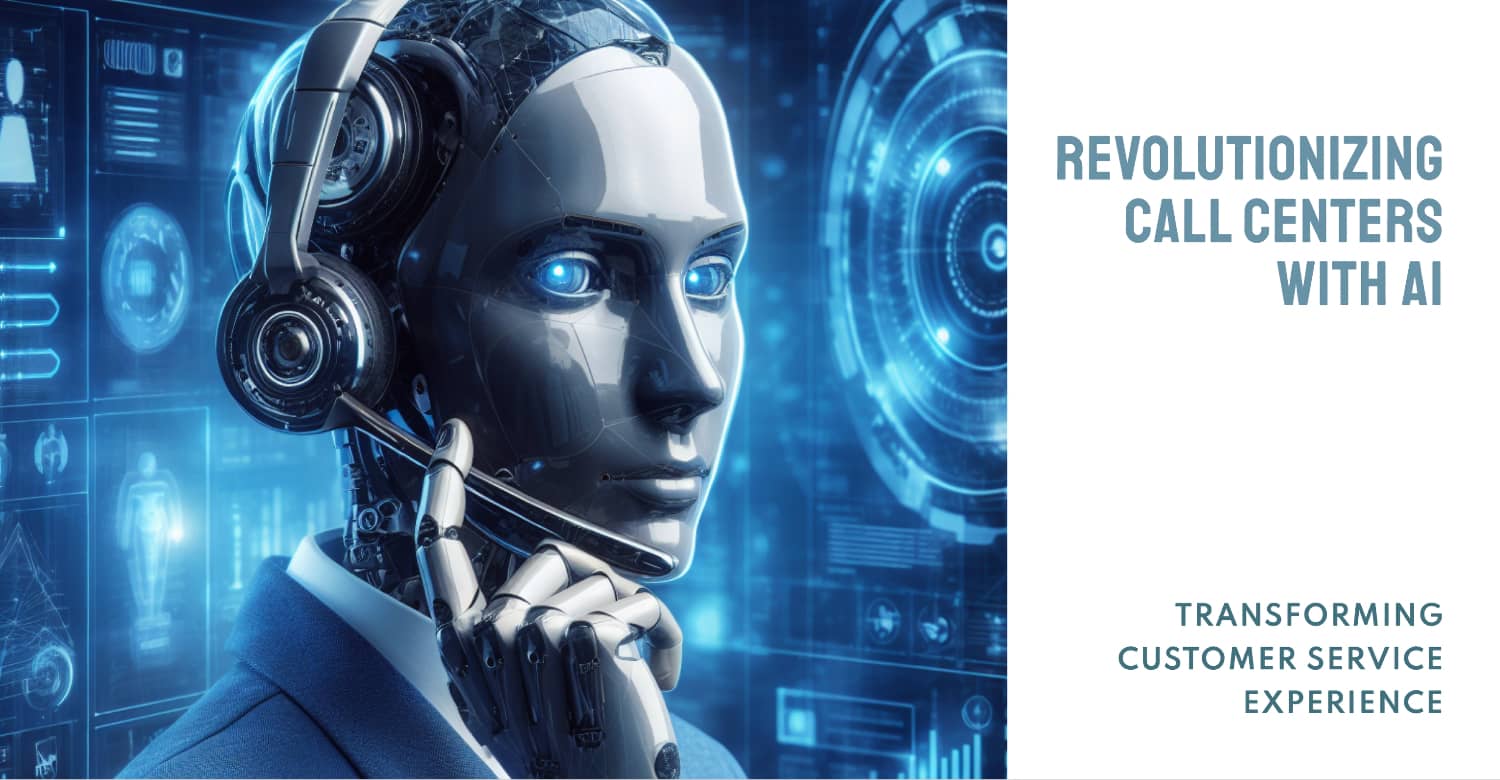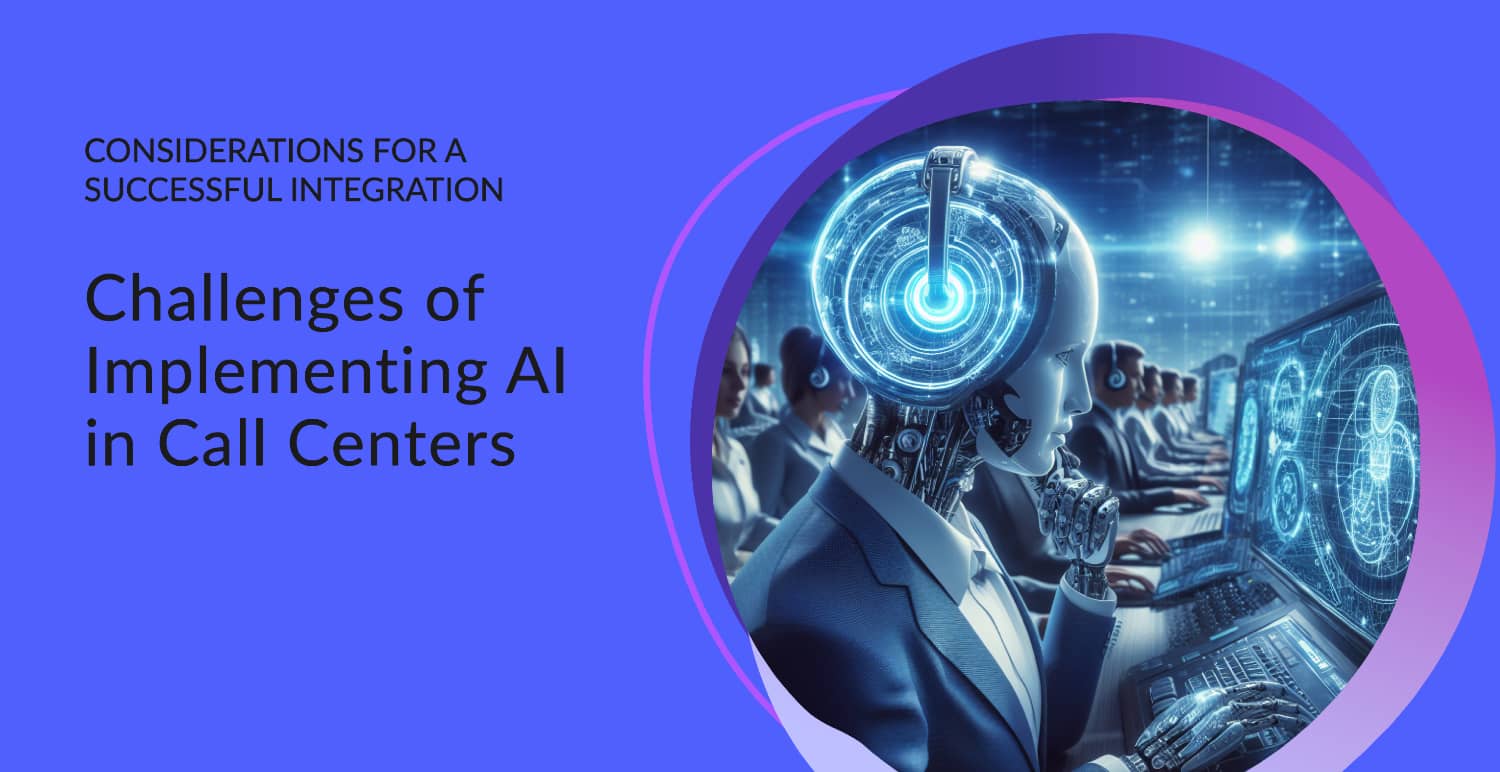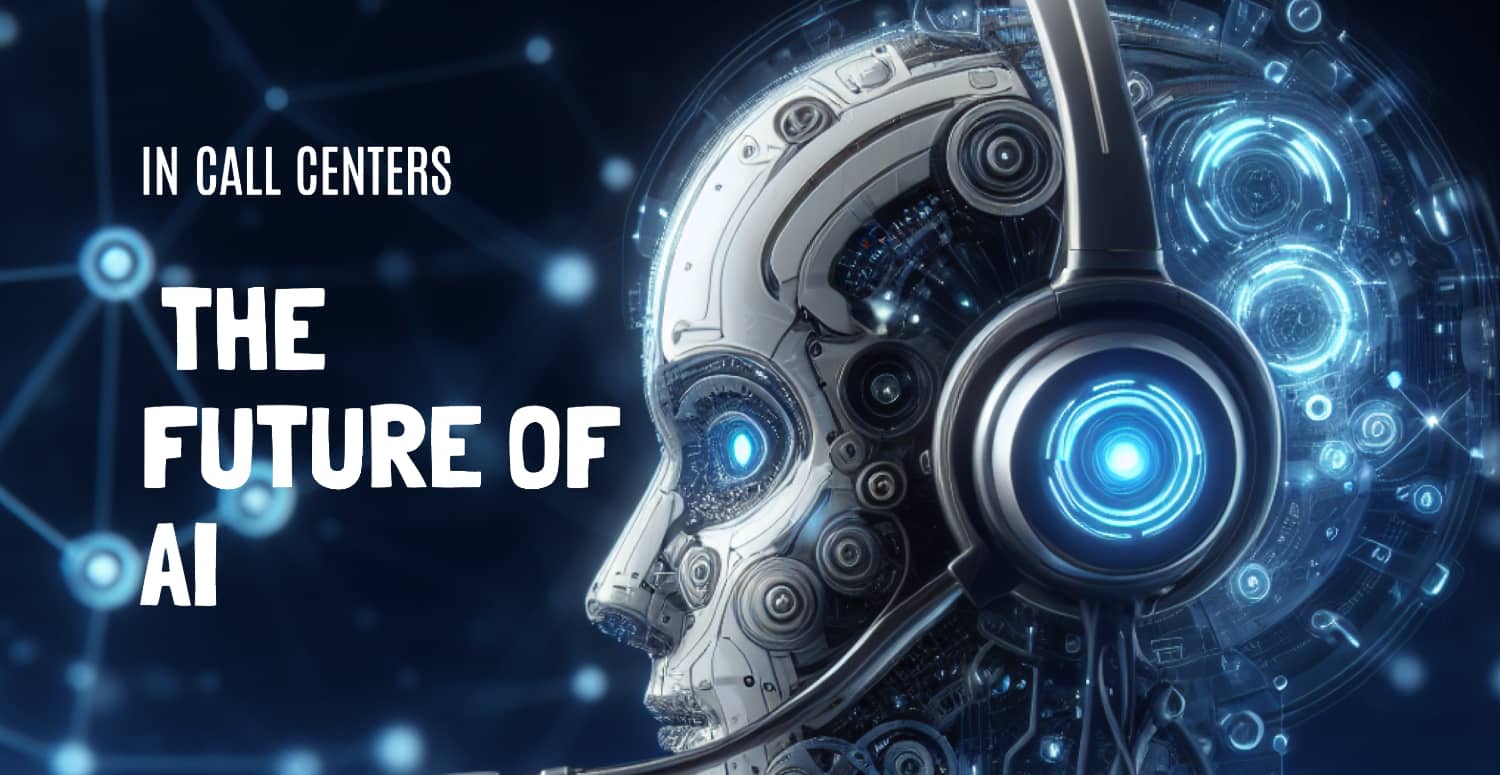Artificial intelligence (AI) has demonstrated immense potential to transform businesses across industries. One area that stands to gain tremendously from AI integration is call centers.
Traditional call centers face persistent challenges like high operations costs, dissatisfied customers from long waiting times, and reduced efficiency in resolving complex issues. According to reports, an overwhelming 70% of consumers now prefer AI-powered conversational interfaces over talking to a live person.
AI introduces innovative solutions to address these pain points through chatbots, virtual assistants, predictive analytics, and more. When effectively implemented, it can optimize workflows, improve customer experience, reduce costs, and boost profits.
This article will explore the key ways AI is revolutionizing call centers to achieve new heights of efficiency and customer satisfaction. We will analyze the tangible benefits AI delivers and provide guidance on successfully integrating it with existing systems.

AI-Powered Solutions for Call Center Optimization
Artificial intelligence empowers call centers with innovative capabilities to automate repetitive tasks, efficiently route calls, gain data-driven insights, and deliver exceptional customer service. By integrating the latest AI solutions, teams can optimize numerous workflows to boost productivity and performance.
Automating Routine Inquiries with AI Chatbots
Dealing with high call volumes handling similar inquiries is extremely labor-intensive for contact center agents. AI chatbots present a viable solution to automate these repetitive, low-complexity customer requests.
Once implemented, chatbots can converse with callers using natural language processing to understand questions and provide answers independently without customers waiting on hold. They access knowledge bases to resolve routine FAQs, handle simple transactions like account balance checks and address updates, facilitate payments or bookings, and more.
According to Zendesk's report, chatbots are predicted to manage 20% of all customer service requests by 2022. This will significantly reduce human workloads allowing agents to focus on requests requiring emotional engagement or complex issue resolution.
Benefits | Examples |
Prompt 24/7 availability | Addressing pre-sales queries or billing questions |
Lower human resource costs | Handlingrepetitive requests like order tracking |
Shorter resolution times | Facilitating routine purchases or appointment bookings |
Streamlining Complex Issues with Virtual Assistants
While AI chatbots address simple, repetitive issues, complex customer problems still require human expertise. Virtual assistants (or intelligent virtual agents) help augment call center staff - they access data resources in real-time and provide relevant information to help agents resolve intricate issues faster.
For instance, an IVA can draw on individual caller history and organizational databases to supply context and suggest potential solutions to agents during live customer conversations. This speeds up response times as agents needn't switch between systems, enhancing overall experience.
By assuming the laborious information gathering tasks from agents, IVAs allow staff to concentrate on core resolution, building rapport through two-way dialogue. They also facilitate post-call follow-ups based on transcripts.
Uncovering Customer Insights with AI Analytics
With exponential data generation, call centers can utilize AI analytics to uncover impactful insights from both historical records and real-time interactions.
Natural language processing scans current call conversations as well as archived ones to detect sentiments, speech patterns, and lexical cues. Expert data models then identify trends, refine lead scoring systems, optimize sales targeting, forecast emerging customer requirements, and derive other actionable findings to formulate winning strategies.
As AI learning capabilities mature further, analytics platforms will become even more proficient at predicting customer needs proactively. Call centers that embrace such self-service analytics solutions early on gain real competitive edges.

Enhancing Customer Experience with AI Integration
Winning customer loyalty requires delivering consistent, satisfactory service across channels. Integrating AI strengthens call centers' ability to resolve issues promptly, understand callers better, and proactively address concerns - thus boosting experience quality.
Swift Issue Resolution with AI Chatbots
Long wait times are a primary driver of dissatisfied customers. However, conversational AI chatbots allow simple purchase orders, billing inquiries or address changes to be handled rapidly without delay.
As chatbots operate round the clock and scale instantly, they drastically improve issue resolution speed. Callers get confirmations and answers in real-time through interactive conversations without frustrating hold periods. This builds positive perceptions regarding accessibility and convenience.
According to industry estimates, over 70% of routine service requests will be managed by AI chatbots soon. This leaves agents free to focus on intricate customer issues. The combined impact enhances collective response rates and satisfaction significantly.
Empathizing Through Emotion Detection
Despite issues being technically resolved, poor communication frequently causes customer frustration. AI sentiment analysis solutions enable better empathy by detecting caller emotions.
By analyzing lexical signals, speech patterns and changes in tone or pace, advanced algorithms identify if customers sound angry, impatient, confused or dissatisfied. The software alerts support agents who can then customize responses, reassure appropriately and amend tones to placate callers.
Such emotional intelligence ensures callers feel heard and understood, a key prerequisite for satisfaction. It also provides supervisors aggregated feedback to fix systemic communication problems proactively through targeted training.
Proactive Identification of Potential Issues
Pre-empting problems customers face is critical for long-term loyalty but extremely challenging at scale without technology. This is where the predictive prowess of AI analytics helps once again.
By continuously mining historical interactions, outcomes and associated caller sentiments, predictive modeling solutions uncover patterns that foreshadow future issues. Common technical problems, shifts in needs and preferences or emerging dissatisfactions become evident through extrapolation of past trends.
Teams can get ahead of such problems by either remedying them preemptively if universal or reaching out to specific customer groups forewarned to be at risk of churn. Such prognostic abilities help call centers augment experience positively.
In essence, integrating AI - whether through bots handling routine volumes swiftly or smart analytics preempting complex issues altogether - enables enhanced, prompt and personalized service at scale, the hallmarks for customer success.

AI's Role in Operational Efficiency and Cost Reduction
Beyond elevating customer satisfaction, integrating AI solutions also introduces major efficiencies for call center operations leading to significant cost savings.
Increased Agent Productivity
Live call agents form the pillars of customer support - their time and effort directly impact budgets. AI augmentation allows agents to boost productivity in three key ways:
Focusing on core duties: By automating data aggregation for context and resolution, IVAs save agents over 20% of average handling time traditionally spent switching between systems.
Specializing in complex issues: Simple purchases, address changes or billing FAQs no longer occupy live staff since chatbots handle over 60% of such repetitive inquiries as per IBM.
Enhanced scalability: AI performs bulk of information processing at speed and scale impossible for humans. This means lesser agents can now manage higher requests without compromising quality.
Cumulatively, this results in over 50% higher agent productivity by some estimates - implying substantially improved budgetary efficiency.
Optimized Resource Planning
Maintaining optimal human resourcing levels is tricky for call centers handling large, fluctuating volumes. AI analytics mitigates this complexity through data-backed recommendations.
By continually monitoring request types, predicted wait times and expected handled calls, AI simulation modeling suggests optimal staffing and schedules to meet forecast volumes and service standards. This allows efficient planning detached from conventional guesswork.
Going forward, as forecasts become smarter, such analytics-based optimization will become extremely valuable in keeping costs in check.
Lower Operational Costs Overall
The combined savings from increased automation, reduced human workload and optimized planning accumulate into substantially lowered operations costs for call centers.
According to McKinsey's global AI survey, close to 50% of companies integrating AI solutions witnessed over 10% cost reductions while 25% saved over 20% expenses.
As AI capabilities mature further, these cost efficiency metrics are projected to improve even more. Call centers that strategically adopt AI early thus gain long-term structural benefits enhancing their budgetary health and competitiveness.

Implementing AI in Call Centers: Challenges and Considerations
While integrating AI unlocks tremendous potential, effectively incorporating such solutions within complex call center environments also poses certain implementation and adoption challenges.
Integration with Legacy Systems
Most call centers utilize multiple legacy systems like CRMs, knowledge bases and communication platforms that power core operations. Introducing new AI tools requires extensive integrations with such existing tech stacks through APIs and interfaces.
Beyond technical complexities, teams must formulate comprehensive data governance policies regarding access, privacy and IP security while establishing AI training pipelines. Such holistic integration spanning data, models and interfaces demands significant upfront efforts.
Training AI Engines
Training AI chatbots and virtual agents with relevant domain data is pivotal before deployment to ensure accurate responses. Teams need to collate vast samples of previous interactions covering various scenarios like technical issues, billing questions or general inquiries.
Curating such exhaustive datasets with target answer sets is non-trivial and time-intensive. Furthermore, the training process requires extensive fine-tuning of neural networks based on different linguistic styles, service standards and output metrics to maximize future accuracy.
Mitigating Human Appehensions
AI integration can also give rise to appehensions amongst call center staff regarding potential job losses from automation. Such perceptions ought to be alleviated through transparent communication highlighting AI's assistance rather than replacement to help teams embrace rather than resist the technology.
Additionally, extensive retraining is imperative for staff to become proficient in leveraging AI tools like virtual assistants and analytics platforms. Investing in such adoption support ensures that new solutions reach full utility delivering return on investment.
While integrating AI has challenges, formulating mitigation strategies around integration complexity, training rigor and user adoption will help call centers implement such tools smoothly for game changing transformation.
Case Studies of Successful AI Integrations
While the potential of AI for call centers appears promising, how have such solutions performed for real-world businesses? Let's analyze two case studies highlighting the tangible impact of strategic AI adoption.
Humana's IVR Revamp Boosts Customer Experience
Leading insurance provider Humana receives over 1 million calls monthly regarding eligibility, claims or payment processing. Addressing these high volumes previously required customers phoning support centers and waiting endlessly to speak with agents.
Humana transformed operations by implementing an intelligent interactive voice response (IVR) system integrated with IBM Watson. The natural language AI solution now handles close to 60% of incoming calls with minimal delays using speech recognition and conversational responses. Callers get personalized self-service easily without frustrating hold times enhancing experience.
Operational efficiency increased simultaneously as automated Volume handling reduced expenses by over 60%. Shorter calls also led to skyrocketing Net Promoter Scores - proving IT drove customer and business growth together.
Sentiment Analysis Brings 28% Higher NPS for Cogito
Global provider Cogito initially struggled with inconsistent customer experience across their 1500 contact center agents handling sales and technical support calls. While agents got product training, best practices for emotionally engaging customers lacked uniformity.
By leveraging Cogito's AI suite featuring real-time sentiment analysis and guidance, agents could understand caller mindsets and adapt tones appropriately during live conversations. Supervisors also gained an aggregated emotional pulse of interactions.
In just 6 months, this AI integration boosted Cogito's Net Promoter Scores by 28% - a testament to the value of sentiment analytics in improving experiences at scale.
The success of Humana and Cogito highlights how AI solutions when strategically adopted and integrated can uplift call center performance markedly through quantifiable metrics.

The Future of AI in Call Centers
The AI revolution has only just begun. As underlying technologies continue maturing, AI innovation will intensify further. Call centers that proactively realign strategies stand to gain the most.
Expanding AI Capabilities on the Horizon
Chatbots today resolve billing inquiries and virtual assistants provide process support. However, as neural learning capacities grow, AI scope will expand dramatically from conversational to cognitive.
Future AI could assume complex duties like contract explanations, personalized advisory and negotiations leveraging inputs from emotions to history. It may also augment human creativity for tailored solutions.
Such versatile, multi-functional AI integration will propel call centers to new efficiency frontiers. The time to start such journeys by laying robust data, analytics and integration foundations is now.
Continuous Education: Imperative to Adopt Emerging Innovation
For call centers to remain competitive as AI proliferates, teams must continuously educate themselves on relevant advancements through subscriptions, training programs and expert collaborations.
Learning about evolving applications, updated best practices, and new risks will be pivotal in formulating adoption strategies that extract maximal value from AI regularly. Such fluid education integrating external expertise will unlock lasting competitive advantage.
A Future Powered by AI-Human Collaboration
Instead of AI replacing swathes of call center staff overnight, the real opportunity lies in effectively combining AI and human skill sets for previously unimaginable transformational outcomes.
There are immense possibilities in meshing the tireless information processing prowess of algorithms with context-aware emotional intelligence unique to human cognition. Such future AI-human collaboration will uplift call centers to altogether new heights of efficiency and experiences.
With the accelerating pace of technological progress, the window for harnessing such synergistic integration is narrow. Call centers need to prioritize formulating strategies today to assimilate innovations seamlessly, leverage complementary AI-human strengths fully and uplift performance continually.
AI-Powered in the Future
The age of artificial intelligence promises unprecedented innovation across sectors, but few stand to benefit more than call centers. AI equips teams with cutting-edge capabilities to optimize operations, supercharge customer experience, reduce costs, and drive revenue growth.
From automatically handling routine inquiries to predicting emerging issues proactively and providing tailored recommendations, AI solutions are transforming workflows. Integration of chatbots, virtual assistants, conversational interfaces, predictive analytics and smart routing has quantifiably boosted productivity, satisfaction and loyalty for early adopters.
As algorithms continue advancing, AI's applications will only expand further. Future AI promises even more versatile automation alongside elevated human creativity through collaborative intelligence. Call centers that proactively formulate strategies to assimilate innovation will be best positioned to extract maximal value.
The writing is clear on the wall - artificial intelligence is the definitive competitive advantage for call centers of the future. The time for businesses to strategically integrate AI to transform operations is now. Leaders who embrace this technology early with the right adoption approaches will drive their call centers to new heights of efficiency, experience and profitability for years to come.


